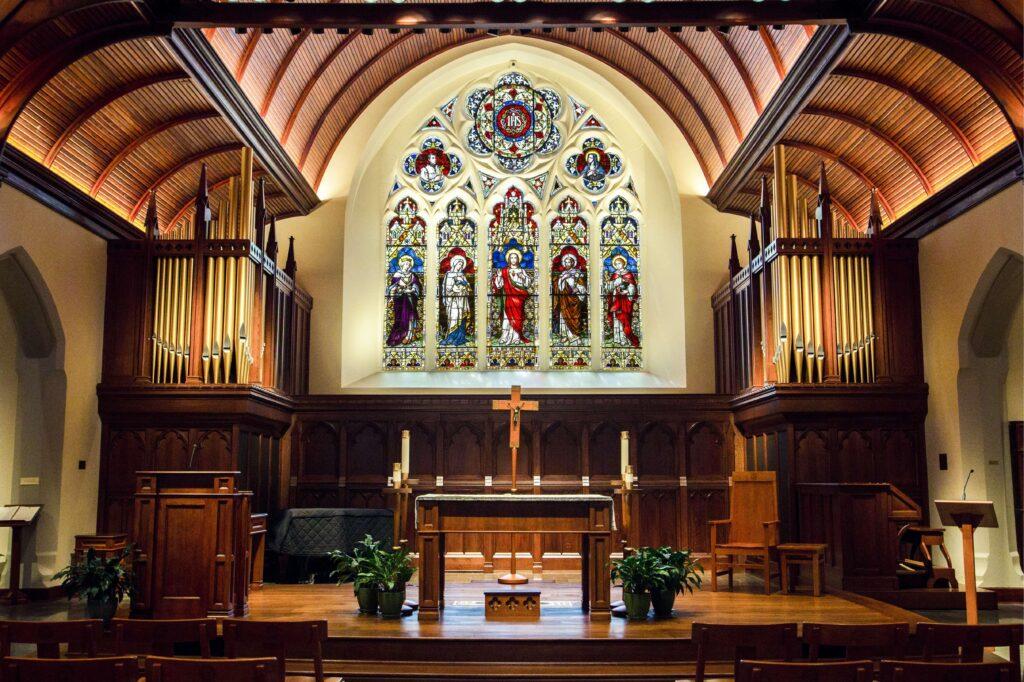The Georgetown University Women’s Center hosted several religious leaders on April 17 to discuss the expansion of roles for women in the Catholic Church.
The event, “Faith, Feminism, and Being Unfinished: The Question of Women’s Ordination,” discussed the writings of the late theologian Anne E. Patrick, SNJM, a 20th century scholar who researched feminist ethics, conscience, liturgy and contemporary expressions of religious life.
The panel was moderated by theologian and Georgetown University Women’s Center Associate Director Annie Selak, Ph.D., and Georgetown University Schools of Health and Nursing Chaplain Sister Celeste Mokrzycki, SSJ.
“This event brings to light the diversity of women’s experiences in the church,” Selak told The Hoya. “In the midst of the ongoing global synod, it is a moment of making visible the many ways that the church, understood as the people of God, is yearning for gender equity.”
The event primarily focused on Patrick’s 1975 essay, “A Conservative Case for the Ordination of Women.” In the essay, Patrick highlights sexism among the clergy and calls for greater acceptance, appreciation and inclusion of women in ministerial and spiritual leadership positions.
The conversation also came as a response to the October 2022 release of the Vatican synod document “Enlarge the Space of Your Tent,” which includes a global call for inclusivity and expanding roles for women in the church.
“Feminist theology seeks to center the experiences of women and marginalized genders, affirming experience as a source of God’s revelation,” Selak told The Hoya.
Georgetown invited a panel of female religious leaders to the event to share their thoughts on the question of women’s ordination.
The panel included Dr. Mary E. Hunt, the co-founder and co-director of the Women’s Alliance for Theology, Ethics, and Ritual (WATER), and Alice McDermott, the award-winning author of “Charming Billy” and “The Ninth Hour.”
Hunt said that the church needs to expand ordaining privileges in addition to adopting a feminist mindset.
“Priesthood as currently conceived was inadequate to the needs of those whom priests serve,” Hunt said at the event. “The model of top-down clerical caste-led Church with no shared decision-making simply does not work.”
McDermott said at the event that the Church has traditionally ignored women’s issues.
“Over the course of my adulthood I have watched our Church abandon the complex moral discussion that pertains to women’s reproductive health in exchange for a simplistic legal solution,” McDermott said. “I’ve seen the leadership of the Church reject the challenge to convince, to counsel, to discern, to preach, in favor of promoting secular laws that will only coerce.”
Lin Henke (CAS ’23), a current senior studying theology and religious studies, said on the event panel that it is hard to pair her identity with seeking leadership roles in the Church.
“I thought that certain attributes of myself were not compatible with the symbol of God,” Henke said at the event. “When I thought that my voice was too high, or that I wore too much pink, or that no one would ever see me as anything but a silly little girl, I was implicitly using the symbol of the conquering male God to undermine my very self.”
Leah Raymond (CAS ’26) said the event helped her reflect on her experience with the Church. Raymond was raised Catholic and said that, despite the Church’s strict traditions, women should still feel empowered to enact positive change.
“I think all women have a moment where they are sad that they will never be able to celebrate Mass,” Raymond told The Hoya. “But I think there is a lot of merit as well — men seem to almost get stuck in the priesthood if they want to religiously contribute to their community, whereas women cannot be priests but have so many other ways to impact their community.”
Selak said that Georgetown has a unique opportunity and duty to be a pioneer in the movement for more women in the Church.
“As the first Catholic University in the United States, Georgetown can be a leader on gender justice in the church and in the world,” Selak said. “All of us have a responsibility to work for a more just world and a more just church.”
Update: This article was corrected on 4/30 to reflect that the Georgetown University Women’s Center, rather than the Berkley Center, was the main sponsor of the event.















